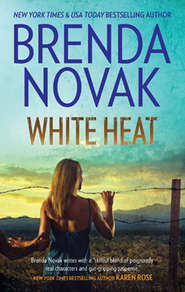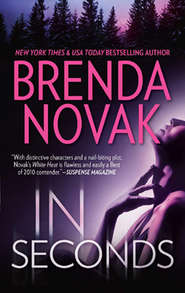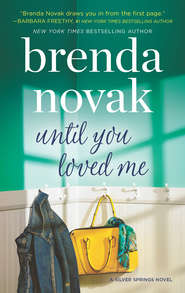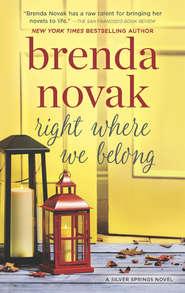По всем вопросам обращайтесь на: info@litportal.ru
(©) 2003-2025.
✖
Dear Maggie
Автор
Год написания книги
2018
Настройки чтения
Размер шрифта
Высота строк
Поля
Maggie raised a doubtful brow. “‘Heartbreaker’ is written all over him, along with ‘catch me if you can.’ I’m not up to the challenge.” She’d spent too much time and energy carefully building her self-esteem to risk losing it on a man like Nick.
“You only think that because you’re a single mom. Single moms can’t be too careful.”
“True.”
“Should I ask him why he’s been staring at you?”
Maggie raised a hand. “No, don’t embarrass me.”
“All right. He probably just thinks you’re attractive, anyway. What man doesn’t?”
“Sometimes it’s very apparent that you haven’t known me long,” Maggie said. “But just for starters, what about Tim?”
“He married you, didn’t he? And let’s face it, in the end, you left him.”
A call blared across one of Maggie’s radios. Instinctively she tensed, listening to the dispatcher’s gravelly voice, then relaxed when she realized it was only a 5150—the call for a crazy person doing something stupid but certainly not news-worthy.
“I had to leave Tim,” she responded to Darla. “If it weren’t for Zach, I probably would’ve hung on, forever grateful that he’d deigned to marry me in the first place. But my son deserves a father who wants him.” She sighed heavily. “Provided I can ever find him one.”
“So that’s what’s happening.” Darla’s expression softened. “The singles scene has finally gotten you down. Is that it?”
Unexpected emotion clogged Maggie’s throat and stung her eyes. What a baby, she thought. Millions of people were lonely, and they didn’t cry about it. But here she was with her nose starting to run, at work, of all places. “There’s just no time to meet anyone. I’m here almost every night and taking care of Zach all day, and let’s face it, spending my afternoons hanging out at McDonald’s Playland isn’t exactly the best way to meet a single guy, you know?”
“You’re working today, so you’re going to have Friday night off, aren’t you? Why don’t you let me watch Zach so you can go dancing?”
Dancing? Dancing was Darla’s idea of fun. Maggie didn’t have much experience with nightclubs.
“I’m not sure a nightclub is the right place to go,” she said, knowing Darla would never understand her phobia about such places. Typical reporters were like Darla, confident and bold and, professionally, Maggie fit the image. For the most part she’d buried the awkward, self-conscious person she’d been as a young girl. But all too often, when it came to her personal life, the old Maggie reasserted herself. “I don’t have a single tattoo or body piercing,” she joked. “I’d probably be a wallflower.”
“No, you wouldn’t,” Darla argued.
An unruly, copper-colored curl tickled Maggie’s cheek, and she tucked it behind her ear. “Anyway, you can’t baby-sit for me. You need to get out, too. You told me you wanted to get married this year.”
“I did until I decided to swear off men for good.”
“You swear off men every Monday. This is only Wednesday. By Friday you’ll be ready to dress up and go out again.”
Ray, from sports, grinned as he strutted past them on the way to Frank Buckley’s office. “Ladies.”
They murmured a quick hello, then rolled their eyes because Ray considered himself such a lady’s man.
“This time I mean it,” Darla went on. “That last loser I hooked up with stuck me with over five hundred dollars in long-distance bills.”
“Ouch.” Maggie grimaced. “You’re as unlucky in love as I am. Maybe we’d be smarter not to hang out together.”
Darla waved her teasing away. “Enough already. We’ll each find someone eventually.” Sitting down, she swiveled to face her computer.
“Wait a second before you go back to that,” Maggie said. “I received something in the mail I want to show you.” Crossing to her desk, she opened the top drawer, retrieved the white envelope with the red heart on the front and returned to Darla’s cubicle. “What do you think of this?”
“What is it?”
“An advertisement for a dating service.”
Darla cocked an eyebrow at her, looking far from impressed. “What do I think? I think you’re nuts. Anyone as attractive as you shouldn’t have to pay to get a date.”
If only Darla understood how painful that whole process was for her—getting out and meeting someone, all the little rituals and deceptions…“I kind of like the idea of the questionnaire. You get to skip the first part of dating, where everyone’s kind of checking other people out.” She flattened the paper against the partition. “Look, it’s right here. You answer these questions so the service can match you up with someone who’s compatible.”
“And they use a crystal ball to decide this? Or do they simply include a ‘no weirdos allowed’ clause in their contract?”
“Come on, Darla. They obviously can’t protect their clients from every possibility, but if Tim and I had filled out one of these we would have known right from the start that we weren’t meant for each other. He didn’t tell me until after we were married that he didn’t want any kids.”
Maggie didn’t add that she’d been so happy to find a man to love her that she hadn’t pressed him on anything, and he simply assumed she’d accommodate his plan for their lives. In the end, her inability to go along with his refusal to have children had come as a big surprise to both of them. “It took me several years to change his mind, and the result was disastrous. He resented Zach from day one,” she said.
“But you could meet someone pretty scary through an outfit like this,” Darla complained. “You could wind up dating a rapist or a murderer.”
“We’d have a greater chance of meeting someone like that at a club. This route takes patience, something rapists and murderers typically don’t possess.”
Darla scowled. “Tell the woman in the Dumpster that. I’ll bet some murderers show incredible patience. Isn’t that what ‘premeditated’ is all about?”
“Come on. We could be going out with guys who have the same level of education, the same goals, the same marital status—”
“Pathetic bordering on desperate? Why would I want to meet someone like that?”
Maggie considered the questionnaire again. “We could always tick the ‘I make over $100,000’ box under annual income and insist on being matched up with someone who makes that, too.”
“Now you’re talking,” Darla said.
NICK STRETCHED OUT in his chair, crossed his legs at the ankle and closed his eyes. He wanted to photograph Maggie Russell. He wanted to dress her in a white sundress that fell off the shoulder on one side and see her through his lens, laughing and barefoot, her thick auburn hair blowing in the wind, her eyes slanting up at him.
It would have to be evening, he decided. That was when the light would be perfect and he’d be able to capture her nearly flawless skin in a warm, gentle glow. The dusting of freckles across her nose, and her mouth, slightly larger than most women’s ideal, added to the earthy beauty of her face. The sun behind her would provide just enough of a shadow to hint at the shape of her body, naked beneath the cotton dress. And he’d shoot her on a beach, where surf the color of her eyes crested in the background and shimmers of heat rose from the sand beneath her feet.
Somehow Maggie Russell managed to combine innocence and vulnerability with an incredibly high dose of sex appeal. The effect was very intriguing. And he could capture the essence of it on film; he knew he could. Someday he’d put her photograph on the cover of the coffee-table book he hoped to publish—when he had the time to pursue his love of photography more seriously.
Right now he had to get back to work. The FBI’s Ogden field office hadn’t sent him to Sacramento to pose as one of the Tribune’s staff photographers so he could waste his time lusting over the beautiful female reporter he was here to protect. The owner of the paper—someone Nick had met just once—was the only one the bureau had clued in to his true identity and purpose. Besides heading the small task force assembled by the Sacramento P.D., Nick had the added burden of performing at the Trib in a manner convincing enough to fool the photo editor who was his boss, his co-workers and everyone else, which meant he had to make the most of every minute.
Sitting up, he reached inside his desk for the file that contained the coroner’s report on the victim found in the Dumpster almost a week ago. He’d studied it exhaustively, but every time he read it, he hoped he’d find something he’d missed before. Something that would illuminate the series of brutal murders that had started along the eastern seaboard almost four months ago, then traveled to Missouri and Colorado and finally the west coast.
The victim’s name was Sarah Ritter. Her death brought the body count to seven. A Caucasian woman in her mid-thirties, she was attractive in a professional, polished way and held a master’s degree in English from the University of California, Davis. She’d taught second grade at an elementary school in the suburbs, had a three-bedroom, two-bath tract house, two children, a dog, and an insurance salesman as a husband.
Unfortunately, she’d also been brutally attacked, raped and stabbed, her body tossed in a Dumpster. How she’d gotten from her house, nearly twenty miles away, to Midtown, was a mystery.
Nick pinched the bridge of his nose. Why her? The other six victims were younger, including the Seattle reporter. Three were single, one had a live-in lover, the last was separated from her husband. All were in their mid-twenties. What had specifically attracted the murderer to these women? What put them at risk?
It certainly wasn’t accessibility. These were difficult murders to commit. The victims hadn’t been living on the street. They weren’t drug addicts or prostitutes. They had homes and jobs, and some had families. Beyond that, they had no obvious connection to each other—they didn’t belong to the same book club, graduate from the same school, attend college together or correspond for private or professional reasons. As far as Nick could determine, they didn’t know each other at all. The only thing they had in common was the fact that they’d become victims of the same murderer.
Random targets, except Lola Fillmore, the reporter in Seattle. That had been personal.
Nick shuffled through another file and came up with the letter that had brought him to Sacramento in the first place. Received at FBI headquarters almost a month ago, it had been printed on regular copy paper by a standard Hewlett-Packard DeskJet. Nothing of particular note there, at least nothing that was going to help him. But the letter itself shed some light on the psychology of the killer.











